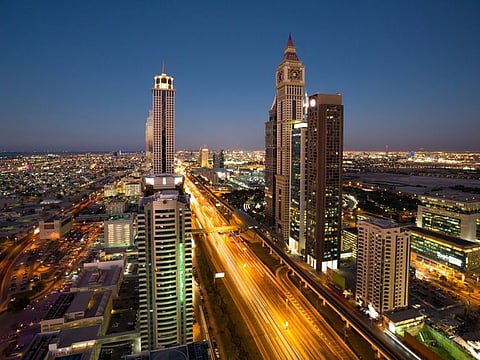Dubai continues march as world’s Web3 capital on foresight, robust infrastructure
Dubai is the world’s only jurisdiction to set up a dedicated virtual assets regulator

The recent launch of Dubai’s Metaverse Strategy by Sheikh Hamdan bin Mohammed bin Rashid Al Maktoum, Crown Prince of Dubai and Chairman of The Executive Council, positions the city as a pioneer offering one of the world’s most advanced and connected ecosystems for the metaverse community to thrive.
The move consolidates Dubai’s status as a global capital of advanced technologies, primarily artificial intelligence (AI) and Web3. Dubai’s regulatory environment and technological infrastructure have attracted several big names in the world of Web3, including cryptocurrency platforms, blockchain companies, and tokenisation firms.
Dubai is already home to over 1,000 companies in the metaverse and blockchain sector, whose current contribution of $500 million to the UAE’s economy is estimated to increase significantly. The Dubai Metaverse Strategy aims to support more than 40,000 virtual jobs by 2030 and add $4 billion to Dubai’s economy in five years.
The emirate is rapidly making headway with its metaverse strategy, announcing the formation of a Higher Committee for Future Technology and Digital Economy chaired by Sheikh Hamdan. The committee will design policies, analyse trends and supervise the implementation of strategies related to the digital economy and future technologies, including the metaverse, AI, blockchain, Web3, virtual reality (VR), augmented reality (AR), the Internet of Things (IoT), data centres and cloud computing.
Dubai’s metaverse leadership
Dubai is the world’s first and only jurisdiction to set up a dedicated virtual assets regulator. In March this year, His Highness Sheikh Mohammed bin Rashid Al Maktoum, Vice-President and Prime Minister of the UAE and Ruler of Dubai, approved Dubai’s Virtual Assets Law (VAL) and established the Virtual Assets Regulatory Authority, firmly cementing Dubai’s leadership in the sector. The law ensures much-needed investor protection, economic security, and market transparency, backed by fully traceable and non-deletable transaction records that fulfil AML-CFT considerations for global interoperability in the rapidly growing domain.
The emirate is also a pioneer in several new-age business sectors like FinTech and eCommerce. The Economist’s Digital Cities Index 2022 ranks Dubai first in the Middle East and 18th globally. Within the index, Dubai is among the Top 10 in digital finance, underscoring the emirate’s lead in blockchain, the engine that powers Web3 and the infrastructure that supports cryptocurrency and digital assets.
Piecing together the regulatory jigsaw
Issuing VAL and establishing VARA is part of Dubai’s strategy to become an international hub for the rapidly growing digital assets sector. VARA is the regulator of choice for many of the world’s most respected cryptocurrency players. With VARA and VAL, Dubai is now at the forefront of the virtual assets industry and continues to play a critical role in its growth, evolution, and regulatory future.
Part of the policy and regulatory jigsaw, the Dubai Metaverse Strategy and the Dubai Blockchain Strategy aim to position Dubai as a global centre for evolving technologies. The Dubai Blockchain Strategy is one of the many initiatives with 24 blockchain use cases currently implemented across eight key industry sectors, including finance, education, and real estate.
Owing to cryptocurrency’s volatile nature and a perceived lack of transparency, many global jurisdictions have been tentative in embracing the trends, with some destinations imposing punitive taxation, if not outright banning it. Cryptocurrencies led by Bitcoin have seen a massive correction in their prices this year, as have global equity and bond markets. Yet, investment interest in digital assets is far from a fad, say industry experts, with inflation pushing many investors to actively consider digital assets as a potential hedge.
“Dubai is committed to enabling economic freedom in the metaverse and empowering its stakeholders, including individuals, innovators, market makers and virtual assets service providers. VARA wants to establish and enable the safe adoption of industry best practices, encourage knowledge-sharing and drive global interoperability while raising awareness,” said Helal Al Marri, Director General of the Dubai World Trade Centre Authority that houses VARA.
The industry has witnessed a surge in institutional and individual capital. Within digital assets, the crypto market is growing particularly fast. Total transaction volume grew to $15.8 trillion in 2021, up 567 per cent from 2020’s totals, according to Chainalysis. Research firm Technavio expects the global NFT market size to grow by $147.24 billion between 2021 and 2026 at a CAGR of 35.27 per cent.
Ahmed bin Sulayem, Executive Chairman and CEO of DMCC, said: “Digital assets are playing an increasingly important role in DMCC’s mandate to drive trade through Dubai. Now home to over 400 of the UAE’s crypto firms – more than one-third – the DMCC Crypto Centre offers a comprehensive ecosystem to facilitate the development and adoption of cryptographic and blockchain technologies. As well as providing access to capital, talent, resources and opportunities, the Crypto Centre is also working closely with the Dubai government to ensure a robust operating environment that places the emirate on the global crypto stage.”







